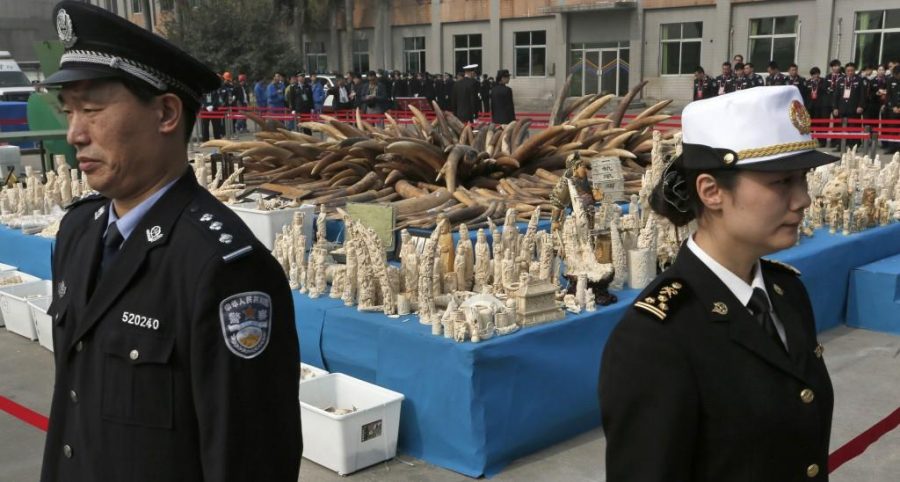Op-Ed: China bans ivory trade, huge step toward ending elephant slaughter
Chinese officials guard a massive amount of confiscated ivory. Last month, the Chinese government announced that it will officially ban all commerce in ivory by the end of 2017. Image source: Share America.gov.
Last month, China announced that it will ban all commerce in ivory by the end of 2017. China is the world’s largest ivory market, and this decision comes after years of global pressure to take action. It represents a giant step toward reducing the slaughter of elephants. While it will take continued concerted efforts by all nations to eliminate the ivory trade, China is to be applauded for this hugely significant action.
The population of African elephants has declined dramatically in recent decades, and there are approximately 415,000 left today. In the last year alone, up to 35,000 elephants have been killed by poachers. This slaughter feeds the global demand for ivory, which is a multi-billion dollar market.
Given the huge financial stakes involved, the poachers are generally well-funded global criminal syndicates. They have sophisticated military hardware and weaponry, along with well-trained mercenaries who do the actual killing, usually from helicopters with machine guns, slaughtering the helpless elephants from the air.
To further reduce the ivory trade and diminish the brutal killing of elephants, the wealthy nations of the world, led by the United States and China, must commit to the following:
- Applying continued intense global pressure on other nations, especially Vietnam and other Southeast Asian countries, where the ivory trade remains a lucrative industry and is widespread.
- Increasing aid to those African nations that are committed to eliminating poaching but whose law enforcement, military and wildlife conservation efforts are overwhelmed by the well-financed poachers.
- Providing military weapons and materials to allow local authorities to more efficiently capture and prosecute poachers. We also need to increase economic aid directly to those African communities closest to the elephants’ habitats. The poachers pay and bribe local Africans to identify and spot elephant locations, as well as to alert them to the presence of soldiers and law enforcement in the area.
It is hard to blame local Africans from accepting payments from international poachers, given the lack of sustainable employment opportunities and other sources of income to support their families. Directing economic aid to these local communities will help reduce the incentive for them to work with poachers.
While none of this is perfect or easy, a united global effort on all three fronts will make a significant difference over time; and while this may seem hopeless, nobody expected China to implement the ban either.
Positive change happens a little bit at a time, but this effort is worth it. Eliminating the ivory trade and saving the African elephant is a noble and achievable goal. At a time of increased geopolitical tension, this is perhaps an issue that all human beings can agree on and support.

Alexandra Chang joined The Oracle as a contributing writer in 2014 and became the Culture Editor in 2016. She was then promoted to Managing Editor as a...












Sonia Arora • Feb 24, 2017 at 5:49 pm
I hope we can end the ivory trade and slaughter of elephants very soon! Great topic and article.
Esther Dafoe • Feb 9, 2017 at 8:35 pm
Wow, this is such a great article! Poaching is such an important topic and this new ban is so exciting and brings me so much hope for the future of endangered animals.